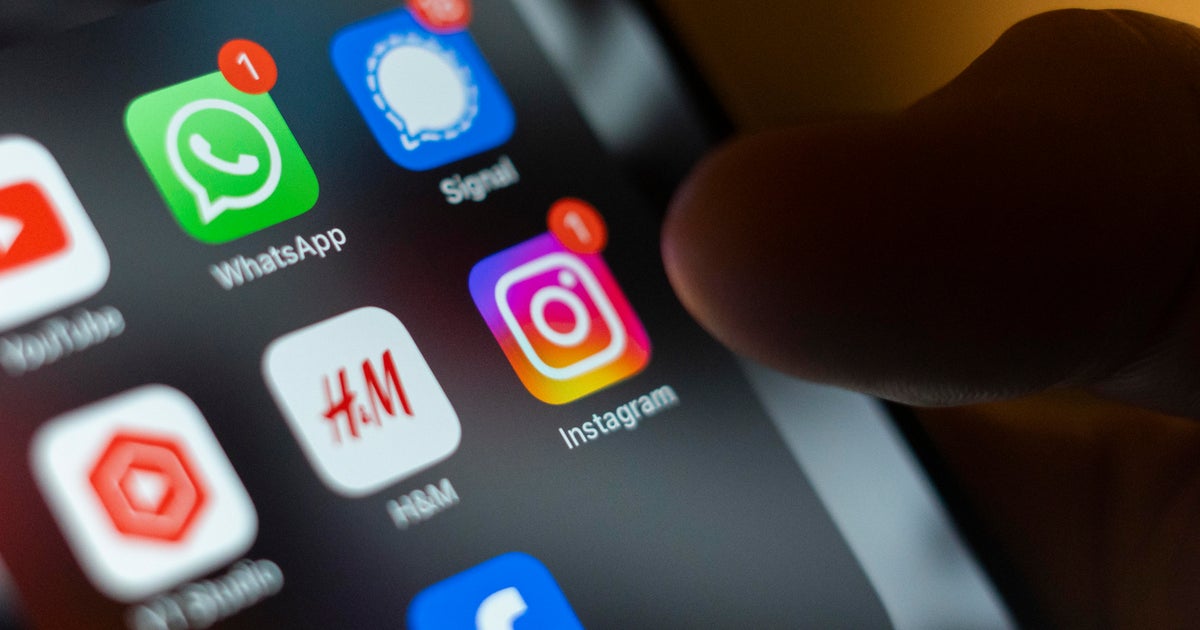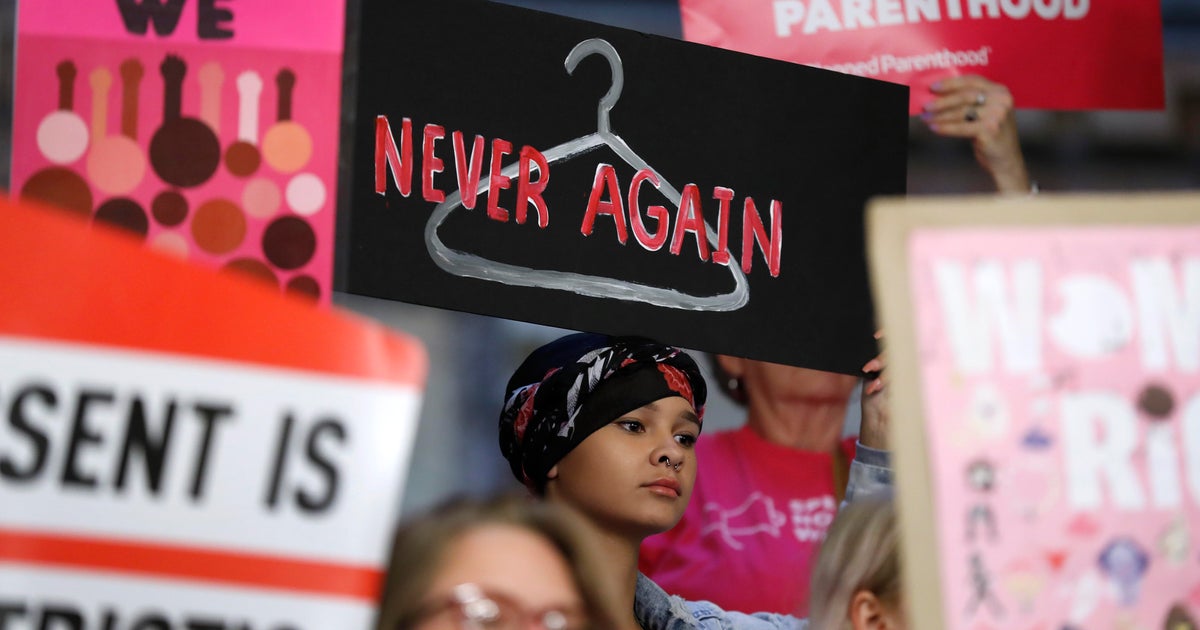CBS News
Reproductive rights expert says “women are going to pay the price” in abortion, IVF battles across United States

NEW YORK — As abortion access and reproductive rights hang in the balance for many women in this country, we take a look at the personal impact of these hard-earned rights and the possibility some face of losing them.
Annie Trombatore Peltzer snuggles her eldest child Rhodes and her newborn daughter Lila, who was born 6 months ago with the help of invitro fertilization, or IVF.
“Life-changing for sure. And life-changing for her. She wouldn’t be here,” Peltzer said.
In 2016, at 26 years old, Peltzer knew she wanted children, but not right then — so she underwent the grueling process of hormone injections and egg retrieval to freeze embryos with the man who would become her husband.
“Fast forward to getting pregnant with Rhodes, and it happened naturally. We didn’t need to use it. Then just this last year, when trying to conceive with her, we tried for about a year, no success, so we were really happy that we had made those choices,” Peltzer said.
But Peltzer’s story is one that has only been possible for around 40 years, and one that might no longer be possible for women in places like Alabama, where IVF is in limbo after that state’s Supreme Court ruled embryos are human beings.
From abortion restrictions to bans on IVF, reproductive rights for women in the United States have never been more uncertain.
“This idea of choice — who even has a choice, right? People who want to parent might not have really the choice to be able to parent,” said Dr. Wendy Schor-Haim, with Barnard College.
Schor-Haim and Dr. Cecelia Lie-Spahn, also with Barnard, are experts in the history of reproductive rights in the U.S. and say this country has a long history of controlling women by controlling their bodies.
“One of the biggest, most important acts of resistance for enslaved women was being able to keep the children that they had because they were so often sold to other slave holders. So I think about this kind of broader historical context in Alabama and how once again, we have this situation where people are told who can have a family, who cannot,” Lie-Spahn said.
Schor-Haim says the tipping point in the way abortion was perceived came with the formation of the American Medical Association, initially run solely by men.
“What’s interesting is that first came the male control, and then came the stigmatization of abortion. So it’s not like there was a national American, you know, popular tide turning against abortion at the time that abortion began to be really restricted. The restrictions caused the stigmatization,” she said.
After years of tireless protests and lobbying, in 1973, the Supreme Court issued its landmark decision in Roe v. Wade, protecting a woman’s right to choose to have an abortion.
According to the Bureau of Labor Statistics, in 1970, the workforce was comprised of 43% women. By 2019, that number had jumped to 57.4%. Scholars say one of the biggest factors credited for that spike in female employment was a woman’s right to control her fertility.
In 2022, the court overturned Roe, giving states the right to choose. In the year since, 21 states have banned or restricted abortions.
“It’s like a runaway train, and people think that they’re controlling it … Women are going to pay the price. Women are like the football in the football game, and it’s really scary to think about,” Schor-Haim said.
“I think we want this world in which people can thrive, and if you don’t have the ability to make choices, can you really [thrive]? Not at all. I think beyond that, then there’s like the real visceral horror of people who, it’s their only way to get pregnant and have that dream taken away from them. That’s a really scary feeling,” Peltzer said.
Providers in Alabama have resumed some IVF services after the state’s Republican governor signed a bill into law earlier this month protecting patients and providers from legal liability.
CBS News
3 Columbia University administrators ousted from posts over controversial texts

NEW YORK – Three administrators have been “permanently removed from their positions” at Columbia College and “remain on leave” over texts they exchanged during an on-campus event about Jewish life at the school, Columbia University’s president announced Monday.
It happened during the school’s reunion weekend at the end of May. The program was called “Jewish Life on Campus: Past, Present and Future,” and took place a month after university leaders called in police to clear pro-Palestinian protesters out of an occupied administration building and dismantle a tent encampment that had threatened to disrupt graduation ceremonies.
One of the controversial messages suggested a panelist could have used recent campus protests as a fundraising opportunity. Another appeared critical of a campus rabbi’s essay about antisemitism.
Texts “touched on ancient antisemitic tropes”
“This incident revealed behavior and sentiments that were not only unprofessional, but also, disturbingly touched on ancient antisemitic tropes,” Columbia President Minouche Shafik wrote in a letter to the Columbia community. “Whether intended as such or not, these sentiments are unacceptable and deeply upsetting, conveying a lack of seriousness about the concerns and the experiences of members of our Jewish community that is antithetical to our University’s values and the standards we must uphold in our community.”
Shafik said the school will “launch a vigorous program of antisemitism and antidiscrimination training for faculty and staff this fall.” Similar training will also be given to students.
Columbia Provost Angela Olinto wrote that the administrators’ conduct was “wrong and contrary to the mission and values of our institution. It revealed, at best, an ignorance of the history of antisemitism.”
Columbia College Dean Josef Sorett, whose text messages were among those published by the Free Beacon, will continue to lead the college after apologizing and committing to working to fix damage caused by the text exchanges, Olinto said. He and his administration will be expected to “deliver concrete change in combating antisemitism and discrimination and creating a fully inclusive environment,” Olinto wrote.
“While not intended as such, some of the text messages exchanged may call to mind antisemitic tropes,” Sorett said in a letter Monday to the Columbia College community. “Any language that demeans members of our community, or divides us from one another, is simply unacceptable.”
“I am deeply sorry that this happened in a community that I lead- and, that I was part of any of the exchanges, and I pledge to spearhead the change we need to ensure this never happens again,” Sorett continued. He said “the loss of trust and the pain this incident has caused, particularly to the Jewish members of our community, must be fully repaired.”
The university did not identify the administrators, who were initially put on leave in June after images of their text exchange were published online by the Washington Free Beacon, a conservative news outlet. The content of the texts was additionally released by the House Committee on Education and the Workforce last week.
CBS News
7/8: CBS News 24/7 Episode 2

Watch CBS News
Be the first to know
Get browser notifications for breaking news, live events, and exclusive reporting.
CBS News
New cyberattack targets iPhone Apple IDs. Here’s how to protect your data.

A new cyberattack is targeting iPhone users, with criminals attempting to obtain individuals’ Apple IDs in a “phishing” campaign, security software company Symantec said in an alert Monday.
Cyber criminals are sending text messages to iPhone users in the U.S. that appear to be from Apple, but are in fact an attempt at stealing victims’ personal credentials.
“Phishing actors continue to target Apple IDs due to their widespread use, which offers access to a vast pool of potential victims,” Symantec said. “These credentials are highly valued, providing control over devices, access to personal and financial information, and potential revenue through unauthorized purchases.”
Consumers are also more likely to trust communications that appear to come from a trusted brand like Apple, warned Symantec, which is owned by Broadcom, a maker of semiconductors and infrastructure software.
The malicious SMS messages appear to come from Apple and encourage recipients to click a link and sign in to their iCloud accounts. For example, a phishing text could say: “Apple important request iCloud: Visit signin[.]authen-connexion[.]info/icloud to continue using your services.” Recipients are also asked to complete a CAPTCHA challenge in order to appear legitimate, before they’re directed to a fake iCloud login page.
Such cyberattacks are commonly referred to as “smishing” schemes in which criminals use fake text messages from purportedly reputable organizations, rather than email, to lure people into sharing personal information, such as account passwords and credit card data.
How to protect yourself
Be cautious about opening any text messages that appear to be sent from Apple. Always check the source of the message — if it’s from a random phone number, the iPhone maker is almost certainly not likely not to be the sender. iPhone users should also avoid clicking on links inviting people to access their iCloud account; instead, go to login pages directly.
Apple urges users to always enable two-factor authentication for Apple ID for extra security and to make it harder to access to your account from another device. It is “designed to make sure that you’re the only person who can access your account,” Apple said.
The Federal Trade Commission also recommends setting up your computer and mobile phone so that security software is updated automatically.








